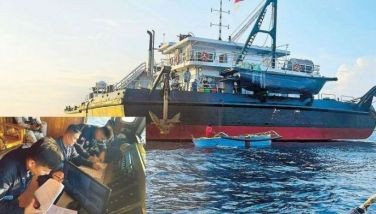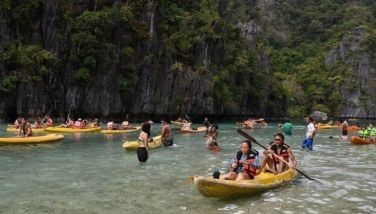Gov’t eyes declaration of Tubbataha as sensitive sea area
December 15, 2006 | 12:00am
PUERTO PRINCESA, Palawan — The Philippine government is preparing a request to the International Maritime Organization (IMO) to designate the entire archipelago as a Particularly Sensitive Sea Area (PSSA) to protect the country’s rich and vast marine resources.
This came at the heels of three environmental disasters, including the Guimaras oil spill, which was considered the largest oil spill in Philippine history.
Speaking here before participants to the conference called Conservation Through Collaboration, Ambassador Alberto Encomienda, secretary general of the Department of Foreign Affairs (DFA)-Maritime and Ocean Affairs Center (MOAC), said the declaration of the Philippines as a PSSA is apt to protect its interests as a "maritime state."
Meanwhile, Sen. Pilar Juliana "Pia" Cayetano sought yesterday the declaration of 18 biodiversity "hotspots" across the country as protected areas, including the famed Tubbataha Reef National Park in Palawan, to the lesser known Sinarapan Lake Sanctuary in Camarines Sur which hosts the world’s smallest fish, known to local townsfolk as the "sinarapan."
By declaring each of these 18 landscapes and seascapes as "protected areas," the government would be able to set up the mechanism needed to protect each one’s biodiversity against destructive human exploitation like logging and poaching," said Cayetano, who chairs the Senate committee on environment and natural resources.
A policy paper prepared by the DFA-MOAC entitled "Proposal for the Designation of the Philippines Archipelago as a Particularly Sensitive Sea Area" is currently awaiting endorsement from the Office of the President. It would be submitted to the IMO for approval.
"A PSSA designation is among a number of available measures to preserve and protect the marine environment, as well as conserve and manage living resources that are already being resorted to by the IMO," Encomienda said.
"It is already an established modality for providing protection to delicate or vulnerable sea areas, especially from shipping activities, and expanding the scope of marine environmental protection measures even beyond national jurisdictions," he added.
Encomienda raised the issue during the two-day national conference here sponsored by the United Nations Educational, Scientific and Cultural Organization (UNESCO) and its National Commission of the Philippines Committees on Culture, Science and Technology.
The national conference is aimed at stepping up efforts to improve management of the Tubbataha Reefs and Greater Sulu Sea, which is a UNESCO World Heritage and Ramsar Convention of Wetlands of International Importance site, and a major fishing ground vital to Filipinos.
"PSSA as a progressive concept is most appropriate and must be harnessed in protecting and promoting the vital national interests of the Philippines," Encomienda said.
According to the WWF-Philippines, PSSAs are areas of the seas and oceans that need special protection through action by the IMO because of their ecological, economic, cultural, or scientific significance, and their vulnerability to harmful impacts of shipping activities.
WWF-Philippines said that valuable ecosystems such as coral reefs, coastal wetlands, and important habitats could benefit from PSSAs while it is also important for migrating birds, sea turtles, whales or other marine species, as well as feeding grounds for valuable fish stocks.
Moreover, the WWF-Philippines said that PSSAs could benefit "marine areas of ability" in coastal nations, so they could impose and enforce their own environmental and navigation regulations on foreign ships passing through their waters.
"Within their 12-mile territorial waters, coastal nations may not ‘impair’ a foreign ship’s right of innocent passage. Beyond the territorial seas, in the Exclusive Economic Zone or equivalent extending out to 200 miles from the shore, coastal states can only adopt regulations that have been previously approved by the IMO," explained the WWF-Philippines paper released to media during the conference.
"As such, international regulations are generally meant to apply to all ships everywhere they go. Thus, it can be difficult to protect discrete areas of the marine environment that are particularly sensitive." — With Christina Mendez
This came at the heels of three environmental disasters, including the Guimaras oil spill, which was considered the largest oil spill in Philippine history.
Speaking here before participants to the conference called Conservation Through Collaboration, Ambassador Alberto Encomienda, secretary general of the Department of Foreign Affairs (DFA)-Maritime and Ocean Affairs Center (MOAC), said the declaration of the Philippines as a PSSA is apt to protect its interests as a "maritime state."
Meanwhile, Sen. Pilar Juliana "Pia" Cayetano sought yesterday the declaration of 18 biodiversity "hotspots" across the country as protected areas, including the famed Tubbataha Reef National Park in Palawan, to the lesser known Sinarapan Lake Sanctuary in Camarines Sur which hosts the world’s smallest fish, known to local townsfolk as the "sinarapan."
By declaring each of these 18 landscapes and seascapes as "protected areas," the government would be able to set up the mechanism needed to protect each one’s biodiversity against destructive human exploitation like logging and poaching," said Cayetano, who chairs the Senate committee on environment and natural resources.
A policy paper prepared by the DFA-MOAC entitled "Proposal for the Designation of the Philippines Archipelago as a Particularly Sensitive Sea Area" is currently awaiting endorsement from the Office of the President. It would be submitted to the IMO for approval.
"A PSSA designation is among a number of available measures to preserve and protect the marine environment, as well as conserve and manage living resources that are already being resorted to by the IMO," Encomienda said.
"It is already an established modality for providing protection to delicate or vulnerable sea areas, especially from shipping activities, and expanding the scope of marine environmental protection measures even beyond national jurisdictions," he added.
Encomienda raised the issue during the two-day national conference here sponsored by the United Nations Educational, Scientific and Cultural Organization (UNESCO) and its National Commission of the Philippines Committees on Culture, Science and Technology.
The national conference is aimed at stepping up efforts to improve management of the Tubbataha Reefs and Greater Sulu Sea, which is a UNESCO World Heritage and Ramsar Convention of Wetlands of International Importance site, and a major fishing ground vital to Filipinos.
"PSSA as a progressive concept is most appropriate and must be harnessed in protecting and promoting the vital national interests of the Philippines," Encomienda said.
According to the WWF-Philippines, PSSAs are areas of the seas and oceans that need special protection through action by the IMO because of their ecological, economic, cultural, or scientific significance, and their vulnerability to harmful impacts of shipping activities.
WWF-Philippines said that valuable ecosystems such as coral reefs, coastal wetlands, and important habitats could benefit from PSSAs while it is also important for migrating birds, sea turtles, whales or other marine species, as well as feeding grounds for valuable fish stocks.
Moreover, the WWF-Philippines said that PSSAs could benefit "marine areas of ability" in coastal nations, so they could impose and enforce their own environmental and navigation regulations on foreign ships passing through their waters.
"Within their 12-mile territorial waters, coastal nations may not ‘impair’ a foreign ship’s right of innocent passage. Beyond the territorial seas, in the Exclusive Economic Zone or equivalent extending out to 200 miles from the shore, coastal states can only adopt regulations that have been previously approved by the IMO," explained the WWF-Philippines paper released to media during the conference.
"As such, international regulations are generally meant to apply to all ships everywhere they go. Thus, it can be difficult to protect discrete areas of the marine environment that are particularly sensitive." — With Christina Mendez
BrandSpace Articles
<
>
- Latest
- Trending
Trending
Latest
Trending
Latest
Recommended

































